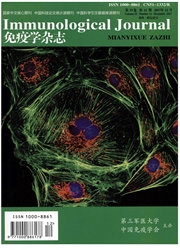

 中文摘要:
中文摘要:
目的本研究以人单核细胞THP-1为靶细胞,研究荚膜唾液酸成分对2型猪链球菌与人单核细胞相互作用的影响。方法透射电镜定性比较野生株及敲除株与人单核细胞相互作用并观察细菌的超微结构;通过涂板计数定量测定比较细胞对细菌的内吞及细菌在细胞内的存活情况;ELISA法检测野生株及敲除株刺激人单核细胞分泌炎症因子的水平。结果猪链球菌唾液酸突变株与人单核细胞间相互作用,在黏附、内吞及胞内存活方面与野生株相比均有显著的差异;野生株对人单核细胞杀伤的抵御能力显著强于唾液酸缺失突变株;唾液酸突变株能更加快速的刺激人单核细胞分泌IL-8,且分泌水平要高于野生株,但对IL-6的分泌无影响。结论荚膜唾液酸在2型猪链球菌致病过程中发挥着重要作用,为进一步探讨荚膜唾液酸参与2型猪链球菌强致病性调控奠定了基础。
 英文摘要:
英文摘要:
This study aims to evaluate the sialylation of capsular polysaccharide of Streptococcus suis serotype 2 by using human THP-1 monocytes as target cells.Transmission Electron Microscopy was used to observe the ultra-structures and qualitatively compare the interactions of THP-1 with wild strain and knockout strain;cell-bacterium internalization and bacterium survival rate were determined by quantitative plating;ELISA was used to test the levels of cytokine secreted by THP-1 stimulated by the two kinds of strains,respectively.We found all Streptococcus suis adhered to and invaded THP-1 cells;and compared to the wild strain,the interactions of mutants with THP-1 shows significant differences.The mutant stimulation could promote THP-1 to secrete higher level of IL-8 than the wild type strain stimulation do,but did not show significant differences in IL-6 secretion.We conclude that sialylation of capsular polysaccharide plays an important role in the pathogenicity of Streptococcus suis serotype 2,which lays a foundation for the future study on the pathogenic regulation of Streptococcus suis.
 同期刊论文项目
同期刊论文项目
 同项目期刊论文
同项目期刊论文
 Rapid visual detection of highly pathogenic Streptococcus suis serotype 2 isolates by use of loop-me
Rapid visual detection of highly pathogenic Streptococcus suis serotype 2 isolates by use of loop-me Prevalent distribution and conservation of Streptococcus suis Lmbprotein and its protective capacity
Prevalent distribution and conservation of Streptococcus suis Lmbprotein and its protective capacity The beta-galactosidase (BgaC) of the zoonotic pathogen Streptococcus suis is a surface protein witho
The beta-galactosidase (BgaC) of the zoonotic pathogen Streptococcus suis is a surface protein witho Rapid and Sensitive Detection of H7N9 Avian Influenza Virus by Use of Reverse Transcription-Loop-Med
Rapid and Sensitive Detection of H7N9 Avian Influenza Virus by Use of Reverse Transcription-Loop-Med Prevalent distribution and conservation of Streptococcus suis Lmb protein and its protective capacit
Prevalent distribution and conservation of Streptococcus suis Lmb protein and its protective capacit 期刊信息
期刊信息
